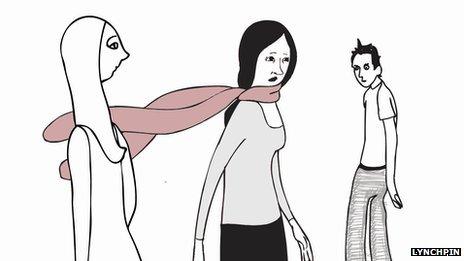The rise in women seeking a perfect vagina
- Published

A research charity has launched an animated film hoping it will encourage debate about the surge of women seeking "designer vaginas".
The film called Centrefold, funded by the Wellcome Trust, features <link> <caption>three women discussing how labiaplasty</caption> <url href="http://www.thecentrefoldproject.org/" platform="highweb"/> </link> - the surgical reduction of the inner labia - has affected them.
Last year more than 2000 labiaplasties were carried out on the NHS, and in the last five years there has been a fivefold increase.
Experts believe the total number is likely to be much higher when considering the unregulated private sector, where the surgery costs upwards of £3,000.
Despite the increase in labiaplasty there are no universal NHS guidelines on the size and shape of normal female genitalia.
Researchers say there is little known about the long term effects and are concerned women are not receiving enough psychological support before opting for surgery.
Anxiety dreams
Jessie said she used to spend hours flicking through magazines looking for women with similar labia to hers. She did not find any.
She said it was "another piece of evidence that there was something wrong with me" and made her feel like a "complete freak".
She experienced recurring dreams where she would imagine her labia as a scarf that would wrap itself around her neck. "There would be people standing around laughing and pointing."
"Shortly after the operation I would dream that they would grow back and I'd wake up in a bit of a panic."
A year on, her dreams no longer occur. She said she feels "really silly talking about it", but it was significant enough to cause her daily anxiety.
Emma also thought her genital area was abnormal. She said before her surgery her labia was "very long, dark, stretchy. It looked disgusting - shrivelled up".
"It was the only thing in my life that made me feel depressed. I was very excited about having labiaplasty. I thought it was going to be the end of all my problems. I thought it was going to look lovely, like a little designer vagina."
Though it is now smaller, Emma is still unhappy with her labia's appearance.
Women seeking labiaplasty need more opportunity to discuss their concerns, said Dr Lih-Mei Liao, a consultant clinical psychologist at University College London Hospitals.
"Worries about the labia are quintessentially psychological. When a woman says she is worried about her labia, surgeons may hear the word 'labia' and operate, I hear the word 'worry'.
"It's difficult when surgery is being advertised as a straight forward solution. It makes it hard for these women to engage psychologically with what's going on."
She added that psychologists "simply aren't being accessed as surgery is being presented as the obvious solution".

Jessie imagined her labia as a scarf around her neck - pictured here in a still from the film Centrefold
Grooming trends
The British Association of Aesthetic Plastic Surgeons is calling for mandatory psychological screening before cosmetic surgery. It said a recent report found that routine psychological checks were carried out in fewer than 35% of clinics.
Dr Liao believes that a woman's anxiety or dissatisfaction with certain areas of her life may manifest itself as body image concerns.
"Surgery may have its place, but it needs to be seen as an extreme solution," she added.
Consultant gynaecologist Dr Sarah Creighton said her clinic sees girls as young as 11 years old seeking surgery.
She found that although a small percentage of women do have abnormal labia, in the majority of cases those with concerns had what she would consider a normal sized labia.
The trend for more extreme pubic grooming leaves the labia more exposed - something which has contributed to more women seeking surgery, said Dr Creighton.
"What we should be doing... is looking at alternatives to surgery so that women have other options, rather than resorting to an operation about which we know very little," she said.
<italic>The names of the women featured have been changed as they wish to remain anonymous. </italic>
- Published24 August 2011
- Published10 February 2011